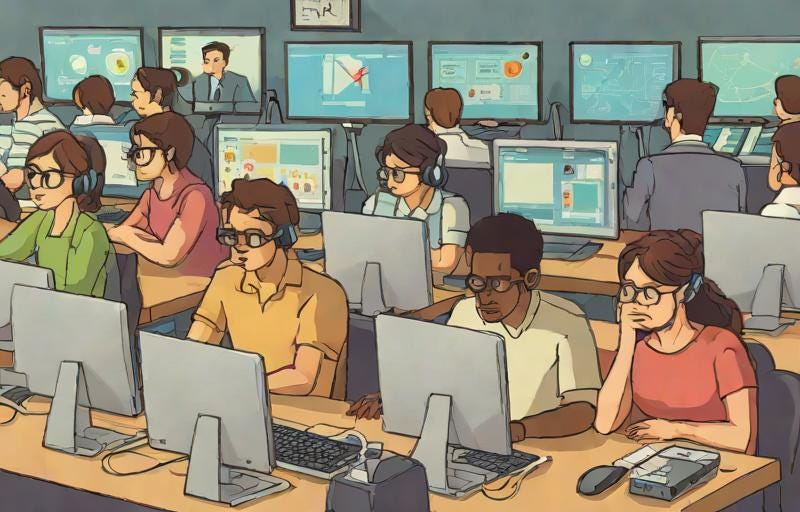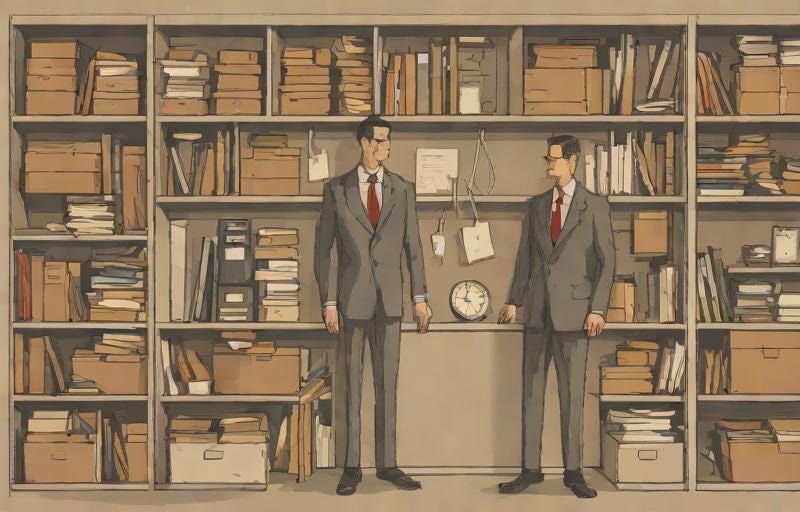The Big Chill, Part III
From colonies on Mars, tractor beams, teleportation, force fields, and androids to staring at screens and making money for Big Tech. What happened?
Colligo is a reader supported guide to artificial intelligence and digital technology, from the perspective of human culture and human values. If you want to support my work, the best way is with a paid subscription. Sign up here:
Hi Everyone,
Thank you for the outpouring of support and insightful feedback on “The Big Chill” and other posts on Colligo. In this installment I’m taking up big picture questions of truth and how we know the truth, and I’ll of course have lots to say about our lady of the hour, LLMs and Gen AI. I feel like others who are writing about these issues cover the news cycle well (Sam Altman is ousted. Sam Altman is back. Musk sues Altman. The NYT sues OpenAI and Microsoft. Microsoft sues…), and while I do cover the “drama,” I’m also intent on understanding what’s happening in broader strokes. Understanding is in limited supply these days. Griping on the web is not.
Critics of AI today and years past performed a valuable service by pointing out the performative limits of the technology and the b.s. of the AI hype cycle. All good. Let’s keep this going. I write about news cycle stuff when I think there’s something still needing to be said, but the “big chill” series is intended as a deeper dive into more basic issues facing us today. All the rhetoric of the present is essentially a vision of our future. What’s that future? What I see coming is a problem, a confrontation, a stagnation, a “chill.” That’s what this series is about.
This post, as with the others in this series, required significant research and reflection, so I’m making it for paid subscribers. I appreciate everyone’s support, and if you find Colligo helpful please do consider a paid subscription. I hope you enjoy. Now, let’s talk about the world falling apart, shall we?
Set Phasers to Stun. Wait—There Are No Phasers.
The late anthropologist and anarchist David Graeber once made a distinction between “poetic” and “bureaucratic” technologies, in his insightful and sometimes hilarious critique of bureaucracy. His argument ventures into politics and other issues I don’t want to cover here, but a core thread is a technological one: in the 1960s on up to the 1980s, we grew up in a world transfixed by visions of future technology that would quite literally create new and wondrous worlds within which we would live and experience life. Maybe the Cold War dichotomies—ironically—gave us such dreams. Our decades long standoff with the USSR brought the Space Race, and from rockets to the moon we got colonies on Mars, jetpacks and flying cars, immortality drugs, antigravity fields, and, of course, androids and robots to clean our kitchens, walk the dog, and take the kids to school. These were poetic visions of alternate futures, not simulated futures with folks staring endlessly into computer screens. We went somewhere (like Mars). We rocketed off to our destination without getting groped by TSA officials, nervously submitting to non-ionizing radiation scans (is that dark spot my? Oh nevermind.) Technoscience would eliminate all this dross. It’d create physical technologies that transformed the physical world—fly the speed of light, go back and forward in time through wormholes. Welcome to the future. Science and technology promised personal power like even Tony Robbins couldn’t match, and it would also unshackled us from bureaucratic conformism and Organization Man.
Well, that never happened. What we got instead was a digital revolution that ushered in an era of folks hemmed into cubicles punching keyboards or poking at digital screens, staring into a rectangle called a “smartphone” all day, playing out our limited years in a decidedly non-poetic future of conformism and petty squabbles on social media. The digital revolution quietly replaced big poetic dreams with a pale substitute that obnoxiously insisted it represented major—exponential!—progress: experiencing the future as a dream or a game, in the “metaverse,” manipulating images and text. We ended up wandering around in Tron, basically, not on some swashbuckling space adventure. What happened?
As Graeber pointed out, computers were a bit of a joke in the 1960s and 1970s, when their use in offices for bureaucratic ends like record keeping, accounting and data analysis became more commonplace. The standard joke back then was “oh, it must be the darn stupid computer again!” System administration was an esoteric practice for nerds babbling about Unix and arguing over Emacs or Vim. Passwords, logging on, all that was a big complicated frustrating mess (some things never change). Digital technology lagged behind the changes in politics, the push to “deregulate,” to merge finance with corporate business, and to make everyone an “investor.” Computers lagged behind all these sea changes bringing about globalization and a new world order, but the direction of “innovation” was set. Jetpacks and hoverboards are, well, hard. Easier to switch to the world of bits.
Keep reading with a 7-day free trial
Subscribe to Colligo to keep reading this post and get 7 days of free access to the full post archives.




